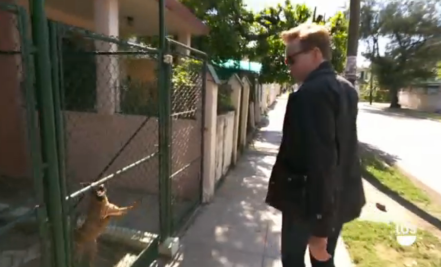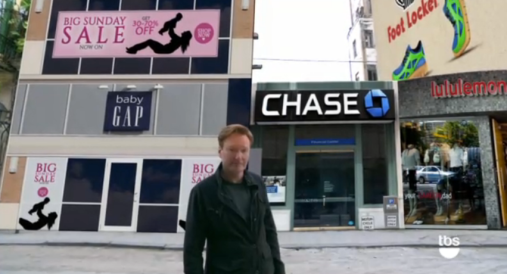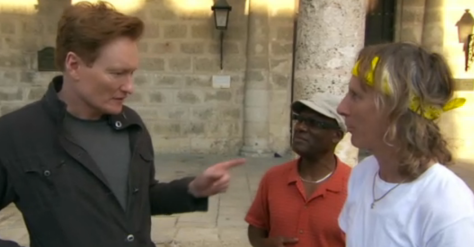Anxiety, tension, exhaustion. Most Cubans or Cuban Americans in the United States will not confess to these feelings when confronted by the latest “Cuban” enthusiasm in US popular culture. We stay silent, nod in recognition, but often this is what we feel. A deeply held sense of vulnerability and enervation can well up whenever someone urges us to watch a Cuba program and give our opinion. It’s a very private discomfort.
So I waited awhile to watch Conan in Cuba. I avoided it. I saw the Cuban flag with Conan on it pop up again and again but did not click. But it returned. Conan kept returning. And under cover of skepticism about Conan, about faddishness and middle American tastes, beyond avoiding disappointment or affront, I knew I was avoiding my own familiar and twitchy wariness in watching Cuba represented. Watching things on Cuba can make a Cuban/American feel bad.
But finally, I watched.
And it was OK. Conan in Cuba was OK. Conan in Cuba did not make me feel bad.
Scene by scene, my wariness dissolved. It was fine, and even better, it was funny. It was not insulting or revelatory, but it was smart. It was not Jack Paar interviewing Fidel Castro in the Havana Hilton, like that long ago Tonight show. It was not Ted Turner (the founder of Conan’s TBS channel) hanging out with Fidel. It was not Barbra Walters come to flirt with Fidel or open American eyes. Conan was on his own (with a camera crew), walking around, and the legend goes that it was a trip free of official chaperones and guides, improvised by his staff and a Canadian producer who had been working in Cuba.
Beyond the opening conceit of an ancient microphone on a side street, a band of fetching musicians, and a dark skinned guy whom Conan dubbed “Cuban Andy,” the frame of the “talk show” disappeared as Conan started walking, and actual comic conversation took over. Dressed initially in a white linen suit and straw hat, invoking countless images from Tom Wolfe to Walker Evans’ Havana, to Alec Guinness in Our Man in Havana, Conan being funny in Havana depended on his becoming a guest. It depended too on the quick wit and humor of his Cuban hosts, their performance of tolerance and familiarity, and also their impatience and light dismissals.
I laughed with relief in many scenes. In one scene on the Malecón Conan is offered rum in a box and a cigarette, which he accepts and then lights, with great amusement the way a tourist would, all the while reflecting on how this moral transgression will mean the end of his commercial sponsors. The laughter incited was based on premises of Conan’s ignorance and learning, of risk taking and self-exposure, sometimes of excess, sometimes of loneliness.
Many times the humor emerged from a respectful recognition that Cubans could take his measure and that their patient dismissals matched his contempt for himself. And this is no small thing, even though it is a hallmark of touristic tropes. By abdicating his role as comic host, Conan managed to make a laughter of intimacy. Exposing himself to the critical laughter of Cubans’ choteo, he instead managed at times to provoke a little bit of confianza, amid interlocutors and viewers, by exposing himself, his naivete, and his solitude, and his rather precarious fame.
Conan’s walkabout, far from Leno’s insipid Los Angeles rambles, reveals not stupid tourists or natives, but lively and thoughtful Habaneros, ready to outperform the host. The laughter Conan provokes, it seems to me, is not derisive or ironic, distancing, or exoticizing. It seems based in everydayness, and in a light assessment of elements that were not political or ideological or even economic. On the one hand Conan engaged the major tropes of Cuba as a place of music, warmth, cigars, rum, and tropical cosmopolitan decadence. On the other hand, Conan engaged Cuba as an extra-ordinary place that deserved to be treated with an ordinary respect.
The show, on reflection, foiled my many prejudices against it. It was intelligent in a gentle way that only comedy can muster. And although he did not veer far from the tourist route, his program, its scenes and its encounters made Cuba seem blessedly ordinary in a very American way. The ordinary seems to me a step forward from exoticism and exceptionalism that frame Cuba. And although in neoliberal logic, ordinariness, everymen, stake holding and entrepeneurship are watchwords for market freedom, for late night comedy, ordinariness strikes a minor key in imagining Havana: a late show, politically for the US imagination.
Conan in Cuba was a product of a four day stay in Havana by a comic host who had never been to the island. How choreographed or coordinated his visit was is not clear, since publicly O’Brien has only alluded to a “Canadian” producer who helped makes things happen quickly and quietly. Perhaps TBS’ history and the relationship between Turner and the Castros helped. Maybe it didn’t, who knows? Perhaps this is merely another in a long set of performances in a Theater of Distraction where Cuba is concerned. I read the show closely because Conan “scooped” other media with his Cuba program, effectively making news in several ways.
Because of that “scoop” and Conan’s comic brilliance, and because we wonder just how the show and its pieces came together,Conan in Cuba is worth reading alongside both serious and comic renderings of Cuba in the global market. Wielding comedy, discretion, understatement, and self-exposure, Conan seems like a familiar surrogate and accomplice for the viewer, a much more “ordinary” and complicated figure than the opportunistic clown or the uncritical jester that the US and exile media are making him out to be.
The show’s scenes visited typical Cuban sites that a tourist might experience. There were no deep thoughts or contexts, there was no lingering on monuments or icons, no mention of revolutionary goals or social ills. The strange leveling touristic register, so long prohibited to Americans where Cuba is concerned seemed somehow, an untrustworthy relief, but a relief nonetheless. Conan moved from scene to scene and the camera moved with him. Whether it was the barking of the neighborhood dogs, or the wry dismissal of his musical talents, the impatience of a Spanish teacher or the unflappable wit of a fetching tour guide at the Rum Museum, from a famous paladar to a Centro Habana rooftop, the show constantly showed Cubans judging Conan, sometimes indulging him, mostly reducing him to a familiar figure, an incidental presence and not a protagonist. He was not a star, or such a curiosity. For them, he was ordinary too.
The show’s many, many advertising breaks also extended the aura of the ordinary: banishing Cuba from the intensities of public television specials. The commercials proved more riveting for a paranoid viewer than much of the program. Commercials were led by ads for Chase Sapphire credit card, whose tourist emo catchprase “Dear World, we can’t wait to meet you!” seems tailor made for the U.S. Cuba rapprochement and its attention to banking. Just as frequent were ads for Stolichnaya Vodka, which produced a strange cold war flashback amid visual puns and left the viewer wondering whether Cubans drink rum or vodka and whether they still dream in Russian. There were ads for Samsung Galaxy cellphones, with high definition selfie photo capacity. There were ads for bourbons, which seemed to be competing pre-emptively with the incipient threat of Cuban rum, even ads or macho Ram trucks (a new import to Cuba?). A curious set of ads by Wieden Kennedy for Powerade featured docustyle direction following Derrick Rose, with Tupak Shakur in a posthumous commercial voice-over saying “We’re all just a kid from somewhere” and as Rose arrives at a stadium “We are the roses. These are my damaged petals. “Don’t ask me why ask me how. Powerade.” It was hard in the intervals of Conan’s palliative humor, not to read these ads as economic or political codes for the ways Cuba will be imagined, oracles for how it will be marketed and what Cuba is understood to mean—its value as a commodity whose time is bought and sold. “Don’t ask me why ask me how” may well be the motto of Cuba’s new political economy.
Between the many commercials, the camera moved prosaically, at first following the comically prosaic host along Havana sidewalks, as dog after dog barked at him on neighborhood streets. Hostile Havana dogs, a comic trope in the program, became like any other dogs. Conan’s act of walking past yards and fences, streets without colonial ruins or socialist landmarks, give a familiar and unfamiliar vision of the city, making it seem like any other city with modest and tidy residential streets, from Los Angeles to Queens.
The barking dogs also serve as a form of comic alarm, far from Cold War drills and sirens but perhaps channeling a more instinctive Cuban suspicion about a tall white American. It seemed somehow as as though Leonardo Padura’s The Man who Loved Dogs was turned upside down in Conan’s the Man Whom Dogs Hate.
As Conan walked around Havana, the breaking of talk show form made us understand him and Cuba in a different light. Not dramatically, sometimes hardly enough to register. But the trope of the tourist flaneur, the wandering without a guide, was enough of a premise to establish a funny intimacy with Cubans, along with a respectful distance about their destiny. Conan’s distinctive quick step, his fair skin, and rather gigantic Irish American tallness, made him stand out. The camera did not linger to absorb the romantic light or scenes, it kept pace with Conan, who was moving from place to place.
Conan talked to well-known musicians (the members of the band Moncada, a band identified with officialdom and the state), to fluently bilingual Cubans, and to what seemed like ordinary people. He walked around some more. He was seen observing Cuba, without knowing exactly what was going on. His artful cluelessness and, for the most part, his refusal to speculate on Cuba’s future, rehearsed another gentle mode of being for Americans: a confession of unknowing, a detachment, a sense of personal insufficiency. Poignantly too, Conan keeps remarking on his unwelcome male solitude, characterizing himself not as a potential consumer of voluptuous Cuban women on an island famous for sexual tourism. He comes across not only as geeky, but as someone intimidated by women and awkward in their company. The show chooses, piously, not to touch the issue of prostitution or sexuality beyond some comic moments about dancing, and Conan emerges as a kind of twitchy (and married) sexual naif, whose latency leaves his senses free for something lighter (and smarter?) than sex.
Two scenes stand out from the comic exchanges with Cubans, and they are scenes where Conan builds a kind of intimacy, a confianza with the viewer. More or less halfway into the show, wearing his own clothes and not the white linen suit costume, Conan is walking through the city as he addresses the viewer in voice-over. His delivery is as clipped as his gait and he says to the viewer “Change is never simple or easy to predict. Will the sudden influx of American money make things better for the average Cuban? Definitely. Maybe. I’m not sure.”

Then, standing on a street where a row of buildings is interrupted by a ruined site, he stops. He looks around, faces the camera, and notes that now Cuba is a place full of character. In three years, he says, the buildings behind him will be replaced by a Baby Gap, a Lululemon, and three Footlocker stores. The depressing CGI scene delivers comically one of the show’s few political punches. Once again, Cuba’s destiny is imagined not as exotic, backward, or socialist, or a miracle of the democratizing market, but as part of a landscape familiar to American viewers, where distinct spaces, “full of character,” are obliterated by the revolution of retail rents and the strip-malling of urban neighborhoods.
The show touches on race only two or three times, and the one comic reflection on blackness in Cuba depends on an invocation of Conan’s white Irishness. The Irish have a long and mixed history in Cuba and they had a decisive impact on its economy and politics, making up a large part of creole aristocratic genealogy, trading in slaves and revolution, but also forming part of the intensely exploited workforce who built Cuba’s railroads. More recently the political alliances of anti-colonialism have linked nationalist struggles and sympathies in Ireland with the anti-imperialism of the Cuban Revolution and a long solidarity between Cuba and Ireland has survived the Cold War. Many Irish have been to Cuba and Irish organizations, from NGOs to piano rescue projects, to musical exchanges, establish cultural bridges.
Conan is Irish-American. He seems to make a point of his Irishness: he wears a green tie with his typical white linen suit, rides a green motorcycle sidecar, reflects on his Boston Irish origins, and at one point engages an Irishman in conversation about sunscreen. In that brief scene pictured above—one of only two times when race is mentioned in the show (the other is a serious note in a voice over on Afro-Cuban culture)—Conan approaches another pale white man and asks him if he’s Irish. He then advises him to protect himself from the sun and then gestures toward an Afro-Cuban man beside them, and says, “You should wear sunscreen. This man was white an hour ago.” This was not a joke Conan would have made in Miami or L.A. In this moment, racial politics become a joke between two white Irishmen, in a way that either abolishes racial difference or elides it. The elision and the joke are telling, since they mirror those of tourism and the market, and they leave little room for anything but an comically Irish negation of race. Conan skirts any serious reflection on race in Cuba, although many of his interlocutors are black or mixed race.
The one other moment of interaction with black Cubans comes at the La Corona cigar factory, when he seems genuinely delighted when the cigar workers showing him the ropes warm up to him and accept a friendly kiss and then kiss him in return. This moment of gentle play counterbalances the earlier moment and introduces an unscripted spontaneity. Once more it comes after Conan makes fun of his manhood and the size of a cigar, and after a cigar worker watches his antics with bemusement and perhaps even disgust. But the friendly kisses, the gesture of warmth, wins the day and closes the episode. Emotion, whether borne by a handshake at a funeral or a kiss in a cigar factory, still counts for a lot in the theater of politics.
Perhaps the strangest and most darkly comic episode of the program is Conan’s Havana rooftop monologue. Havana’s azoteas or rooftops are ordinary and legendary places. They have been the atmospheric setting of many tourist pictures, of artists’ photographs full of tropical light, of film after film from Memorias del subdesarrollo to Juan de los muertos, of literary scenes, and artists’ salons (like Reina María Rodríguez’s famous gatherings); the many worlds of Havana rooftops were even developed in recent reporting.
But on this rooftop scene, Conan sticks to the minor key: he surveys the romantic light of Centro Habana at sunset and notes how pathetically alone he is. But as the scene progresses, he looks around at the rooftops in the dimming light and his surveillance yields slim results: a man and a dog, two men with homing pigeons on a rooftop, the general quiet, and then more barking from a dog. Turning to the viewer in the wake of the vacuum of activity, he changes tone to a dramatic reportage, “I am now solely reporting on the barking of a dog. I am realizing Anderson Cooper has a very easy job.” In that moment, a CNN Breaking News banner appears on the screen below Conan:
And with that comic frame, where a star designates the capital and the headline “Havana Dog Stops Barking” Conan’s lonely banal rooftop outpost in Centro Habana is connected to the rooftop correspondent mise-en-scene of countless third world television dispatches, from Cairo to Baghdad to Port au Prince. But Conan on the scene both reminds us and robs us of the sensational events and protagonism of those heroic correspondents. This moment of parody in an otherwise mild comic repertoire unassumingly takes apart a series of commonplaces for American viewers who watch for representations of the third world. On the one hand, nothing much is happening in Cuba, and the news of great events is undercut. The invocation of war reporting implicitly reminds us, like the embargo and the ruins of Havana, of a bombing that never happened, of a war that was, and never was. But the comic undercutting of these tropes—Havana’s sunset and its third world revolutionary potential—works subtly, like an improvised joke that one might share with a friend on such a rooftop. In parodying the dispatch and the history-laden, dramatic prose of correspondents, Conan chronicles nothing: one dog barking, that stops barking, and begins to bark again. With comedy, Conan underlines how correspondent’s monologues, like the monologues of political speeches are not only “easy” work, they are also funny, and they might even be fundamentally unreliable. Conan’s correspondence with the viewer delivers a very low-intensity comic recognition: what Cubans call choteo, or mockery. And choteo’s comic understanding, little by little, dismantles in small bites and everyday life our epics, our monuments, and even, when we’re lucky, our political lies.
Almost a hundred years ago, James Joyce wrote this near the end of A Portrait of the Artist as a Young Man: “I will tell you what I will do and what I will not do. I will not serve that in which I no longer believe, whether it calls itself my home, my fatherland, or my church: and I will try to express myself in some mode of life or art as freely as I can and as wholly as I can, using for my defense the only arms I allow myself to use — silence, exile, and cunning.”
Joyce’s words are perfect for understanding Cuba, its exiles and its diaspora, for trying to account for what Cuba means and what it weighs, and how it makes even late night TV a realm for defense and taking up arms. “Silence, exile, and cunning,” are the only arms that Joyce chooses. With the return of the American host to Havana, and Conan in Cuba, cunning seems more and more like the last, best, option.










Excelente análisis. Particularmente, coincido también con sus opiniones. Gracias.
LikeLike
Totalmente de acuerdo.
LikeLike